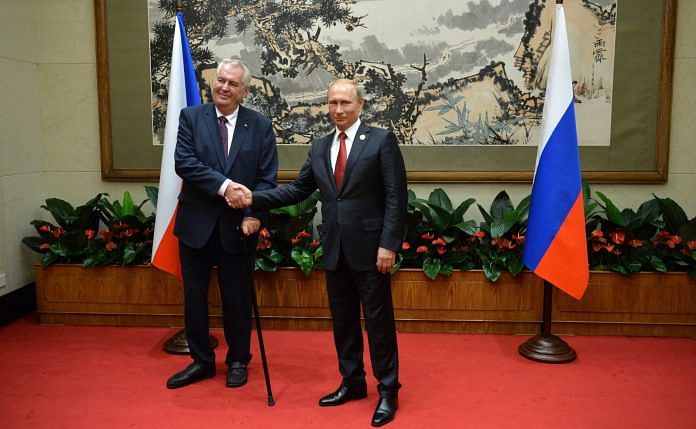Europe’s possible new Trump
On Friday, the Czech Republic will be holding its presidential elections in “their most important election since 1989”, writes Jakub Janda in the Washington Post. The winner of the first round of the election was the incumbent Milos Zeman, who is currently facing close competition from Jiri Drahos.
“For Czechs, Zeman needs little introduction. He has spent his first five-year term excoriating migrants and Muslims, whipping up fears of terrorism, and praising President Vladimir Putin of Russia. He is possibly the closest thing to President Trump that we have today in Central Europe – except Zeman took office long before Trump did,” writes Janda.
“Zeman’s trademark version of political incorrectness remains widely popular. A chain smoker and heavy drinker, he once declared that “journalists should be liquidated,” and said of a famous environmentalist group that he would treat them the “good old medieval way: burn them, piss on them and salt them.”
“It is no coincidence that Zeman’s best friend among foreign leaders is Putin, with whom he regularly meets,” Janda writes, after pointing out a long list of similarities Zeman shared with Trump.
“Liberals in the Czech Republic have high hopes that Drahos will restore the country’s battered reputation as a bulwark of western values. Yet despite all Zeman’s flaws, there is still a strong chance that he – a populist, openly pro-Russian candidate who is directly supported by the Kremlin – might win the presidential election.”
Sounds familiar, asks Janda.
Stuck in the middle
“The rivalry between Saudi Arabia and the United Arab Emirates (UAE) on one side and the Gulf state of Qatar on the other is spilling poison into the Horn of Africa, embittering animosities between half a dozen countries in the region,” the Economist reports.
“Broadly speaking, the regional imbroglio pits two camps of Muslims. One is a more vigorously Islamist lot, including Qatar and Turkey, which have been friendly towards the Muslim Brotherhood, an Islamist movement spanning many countries, and seek better relations with Iran. The other is an alliance led by Saudi Arabia, the UAE and Egypt, whose governments all loathe the Brothers and proclaim themselves as moderate Sunnis particularly hostile to the Shia version of Islam promoted by Iran.”
According to the Economist, Egypt has deployed troops in Eritria on its shared border with Sudan. Yemen’s civil war is also furthering regional tension, and the countries of the Horn of Africa are taking sides: Djibouti gave France military bases, and Sudan deployed troops against the Houthis as part of a Gulf coalition. Somalia has been friendly towards Turkey, but Somaliland has made a deal with the UAE.
All in all, the situation is worsening, dragging other regional players into the fray.
A turning point for Liberia
Liberia just elected a former football player, George Weah, to be President of the country. However, he will inherit the the country’s deeply corrupt political system, writes Benjamin Spatz in the New York Times. While the country made significant strides under Ellen Johnson Sirleaf’s tenure, multiple crippling shortcomings still remain.
The last civil war ended in 2003, but 54 per cent of Liberians still live in poverty. It went through a recession, exports dropped, and Ebola hit the country hardest in West Africa. Despite this, Sirleaf worked to lift Liberia out of debt, protected human rights and free speech, and appointing anti-corruption committees to investigate the problem that is so rooted within the country’s fabric.
“Such structural problems resist easy fixes and the odds rarely favor reformers, but at certain moments — such as during political transitions — narrow windows of opportunity open. Mr. Weah is in such a moment, because Liberia, while still fragile, has passed through the period when restoring stability had to be an absolute priority. He can now turn to smaller technical fixes that did not even appear on Ms. Sirleaf’s radar,” writes Spatz.
“Mr. Weah faces a moment of consequence and a rare opportunity to build on Ms. Sirleaf’s successes. She brought Liberia back from the dead. Now it’s his turn to nurture the country’s fledgling institutions by taking on its coercive, corrupt political culture.”



